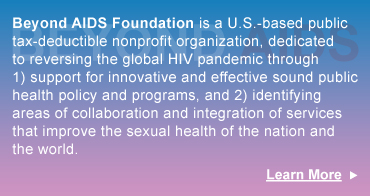Third Try is the Charm as California Implements Name-Based HIV Reporting
As of mid-2006, local health departments throughout California were instituting name-based HIV reporting, following passage of Senate Bill (SB) 699 and its signing by Governor Arnold Schwarzenegger in April. The bill was to take effect immediately as an emergency measure.
Beyond AIDS has hailed passage of the bill and has recognized the author, State Senator Nell Soto, with a "Nettie" award. Another special award has been given to the AIDS Healthcare Foundation which served as a lead sponsor (see separate article on Beyond AIDS Web site www.beyondaids.org).
The success of SB 699 followed two previous unsuccessful attempts to achieve similar legislation, SB 1029, introduced by Senator Ray Haynes in 1999, and SB 945 in 2005, also by Soto. Both of the previous bills had stalled in state Senate committees, due to opposition by AIDS activists concerned about confidentiality and potential deterrence of HIV testing. Beyond AIDS had sponsored the first and strongly supported each of the following two bills.
For the first 20 years of the HIV/AIDS epidemic, California did not have any reporting system at all for HIV other than for cases that had progressed to full-blown AIDS. Starting in 2002, an unwieldy 17-digit code system for anonymous reporting was instituted by adoption of a regulation opposed by Beyond AIDS. That system did not satisfy the federal Centers for Disease Control and Prevention (CDC) as being capable of assuring timely, accurate, and unduplicated case counts for surveillance.
California's bill is part of a wave of similar changes across the country. For years, there had been a battle between advocates of names vs. anonymous codes sometimes called "unique identifiers." It appears that as of 2006, the battle is on the verge of total victory by the name advocates.
As of 2005, California was one of only 8 states that did not report HIV by name. CDC did not accept the data from any of them as being reliable, nor did it fully utilize data from a handful of states utilizing names initially but converting them to codes. All of those states faced a loss of federal Ryan White funds for HIV/AIDS, due to a provision in the 2000 renewal of the Ryan White CARE Act mandating that states with inadequate HIV reporting systems by October 2006 be funded only on the basis of their AIDS cases. California faced the loss of at least $50 million annually.
The other jurisdictions and with coded HIV reporting have been scrambling to meet that deadline. During the last year, Illinois, Massachussetts, and Hawaii have changed from codes to names for HIV reporting, and Maryland and the District of Columbia were teetering on the verge of a similar change. the city of Philadelphia, which had held out against the state's name reporting, gave in and adopted names as well. And Washington State and Oregon have switched from name-to-code hybrid systems to fully name-based reporting. Beyond AIDS was represented on Oregon's advisory committee on HIV reporting, and supported the change.
Beyond AIDS has opposed coded reporting since its founding in 1998, not only because of inaccurate tabulations, but also because it interferes with the ability of public health officials to confidentially interview infected persons regarding partners who may need to be notified, to refer them to needed health and social services, and to help them avoid infecting others. Studies have indicated that fears of breaches of confidentiality and of discouraging HIV testing are largely unfounded.
Official sponsors of SB 699 and its predecessor SB 945 included the County of Los Angeles. and the Health Officers Association of California, in addition to the AIDS Healthcare Foundation. Many activists showed up at the state Capitol to testify in favor or to support the bill in 2005, largely due to the concern about preserving federal funding.
AIDS has been reportable by name in California for over 20 years, with over 135,000 cases reported over the years without any violations of confidentiality. However, reporting of HIV cases that are not advanced enough to meet the criteria for AIDS had always been controversial, in spite of a lack of any breaches in confidentiality.
Over 80 other communicable diseases and other health conditions are legally reportable by name in California, and reporting of both AIDS and all other diseases throughout the United States is done using names. HIV cases that have not progressed to AIDS were the sole exception and the only subject of contention, and that exception seems to be on the verge of extinction.
![]() Return to Archived Articles and Letters
Return to Archived Articles and Letters

